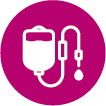The Chiesi Total Care Program Assists With:

Commercial insurance
If you have private insurance through your job or own your own business.

Government insurance
If you have Medicare, Medicaid, Veterans Affairs Healthcare, or other similar government insurance.

No insurance
If you have no insurance, you may be eligible for additional financial assistance.

Dedicated Total Care team:
- Pharmacists
- Patient service coordinators
- Reimbursement support specialists
- Nursing support

Infusion assistance
- Ensures medication is delivered right to where you need it
- Assists you in finding an appropriate infusion facility
- Answers questions about administration, storage and disposal, and more
- Reviews eligibility for home infusion assistance†
| † | If you are receiving treatment or residing in MA or RI, you are not eligible for infusion assistance. To receive home infusion support, you must be referred to home infusion by your prescribing physician. Please refer to the full Terms and Conditions for additional eligibility requirements. |
For more information about Lamzede® (velmanase alfa-tycv), visit Lamzede.com.
Helpful Links
For more information about Lamzede® (velmanase alfa-tycv), visit Lamzede.com.
Important Safety Information
What is the most important information I should know about Lamzede?
Severe allergic reactions (hypersensitivity reactions) including anaphylaxis, may occur during and after Lamzede treatment. If severe allergic reactions or anaphylaxis occur during treatment, your healthcare provider will immediately stop the infusion and provide appropriate medical care. If these reactions should occur after treatment, seek immediate medical care.
What should I know about infusions?
Your healthcare provider may give you other medications prior to your next infusion to help manage allergic reactions and infusion-related side effects. They will explain how to recognize the signs and symptoms of these allergic reactions and infusion-related side effects. If these signs and symptoms occur, it’s important for you to seek immediate medical care.
What are the common signs and symptoms of an allergic reaction or infusion-related side effects with Lamzede?
In clinical trials, some patients experienced signs and symptoms of an allergic reaction, which included bluish skin discoloration, low blood pressure, vomiting, hives, skin redness, facial swelling, fever, and involuntary movements.
In clinical trials, when patients experienced an infusion-related side effect, the most common signs were fever, chills, skin redness, vomiting, cough, itching, rash, and pink eye.
Are there certain people who should or should not take Lamzede?
Lamzede may cause harm to your unborn baby. For females who are able to become pregnant, your healthcare provider should do a pregnancy test before you start treatment with Lamzede. Tell your healthcare provider right away if you become pregnant or think you may be pregnant. You should use effective birth control during treatment with Lamzede and for at least 14 days after the last dose.
What are the most common side effects of Lamzede?
Lamzede can cause side effects including severe allergic reactions and anaphylaxis, common cold, fever, headache, and joint pain or stiffness.
Please see Full Prescribing Information for Lamzede.
You are encouraged to report negative side effects of prescription drugs to the FDA. Visit www.fda.gov/medwatch or call 1-800-FDA-1088.
Indication
Lamzede® (velmanase alfa-tycv) is intended for the treatment of non-central nervous system symptoms of alpha-mannosidosis in adult and pediatric patients.
Important Safety Information
What is the most important information I should know about Lamzede?
Severe allergic reactions (hypersensitivity reactions) including anaphylaxis, may occur during and after Lamzede treatment. If severe allergic reactions or anaphylaxis occur during treatment, your healthcare provider will immediately stop the infusion and provide appropriate medical care. If these reactions should occur after treatment, seek immediate medical care.
What should I know about infusions?
Your healthcare provider may give you other medications prior to your next infusion to help manage allergic reactions and infusion-related side effects. They will explain how to recognize the signs and symptoms of these allergic reactions and infusion-related side effects. If these signs and symptoms occur, it’s important for you to seek immediate medical care.
What are the common signs and symptoms of an allergic reaction or infusion-related side effects with Lamzede?
In clinical trials, some patients experienced signs and symptoms of an allergic reaction, which included bluish skin discoloration, low blood pressure, vomiting, hives, skin redness, facial swelling, fever, and involuntary movements.
In clinical trials, when patients experienced an infusion-related side effect, the most common signs were fever, chills, skin redness, vomiting, cough, itching, rash, and pink eye.
Are there certain people who should or should not take Lamzede?
Lamzede may cause harm to your unborn baby. For females who are able to become pregnant, your healthcare provider should do a pregnancy test before you start treatment with Lamzede. Tell your healthcare provider right away if you become pregnant or think you may be pregnant. You should use effective birth control during treatment with Lamzede and for at least 14 days after the last dose.
What are the most common side effects of Lamzede?
Lamzede can cause side effects including severe allergic reactions and anaphylaxis, common cold, fever, headache, and joint pain or stiffness.
Please see Full Prescribing Information for Lamzede.
You are encouraged to report negative side effects of prescription drugs to the FDA. Visit www.fda.gov/medwatch or call 1-800-FDA-1088.
Indication
Lamzede® (velmanase alfa-tycv) is intended for the treatment of non-central nervous system symptoms of alpha-mannosidosis in adult and pediatric patients.





